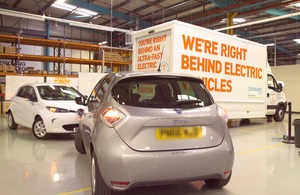Trialling tomorrow’s technology today: businesses show the way
Innovate UK funding helps companies show how they can tackle challenges such as safe decommissioning of nuclear plants and electric car charging on the go.

Zapinamo is taking its mobile charging units out to users of electric vehicles
Businesses are demonstrating how their ideas can tackle real-world challenges and serve customers with the help of Innovate UK funding.
Many companies struggle to demonstrate how their innovative ideas will work in a commercial environment because of the significant cost of running trials at a meaningful scale.
Innovate UK’s opening ‘first of a kind’ competition funded around a dozen trials ranging from reuse of electric car batteries for home storage to imaging technologies for radioactive waste and systems to help cities make better use of their operating networks.
Lynkeos: safer nuclear decommissioning
Scottish business Lynkeos trialled its Muon Imaging System that monitors what is going on inside shielded containers of nuclear waste.
Traditional x-ray technology cannot be used as the containers are designed to prevent radiation penetration.
The Lynkeos system uses naturally occurring cosmic particles called muons to image the contents without opening the containers.
Decommissioning of nuclear facilities in the UK is expected to cost £80 billion over the next 100 years. The Lynkeos system could help to make the process cheaper and safer.
Secure Sensor: keeping the vulnerable at home
Internet of Things business Secure Sensor Innovative Design showed how its safe house system could be used to help the elderly and vulnerable stay in their home in Liverpool.
Many vulnerable people have to leave home because there is no cost-effective way to remotely monitor environmental conditions where they live.
The safe house product measures temperature, humidity, and electricity status, and listens for fire and carbon monoxide alarms. It sends information in real time to a nominated carer.
Vivacity: tackling congestion in cities
London-based urban mobility experts Vivacity Labs showed how video analytics could be used to deliver the first real-time, city-wide data feed on a whole transport network in Milton Keynes.
Vivacity’s video analytics uses the latest technology to accurately detect and analyse traffic movements. It provides real-time data on public transport, roads, pedestrians, cyclists and car parking.
Congestion is costing local authorities a huge amount of money, and they are all looking for ways to manage it and cut pollution.
Zapinamo: mobile charging for electric vehicles
Electric vehicle charging business Zapinamo trialled its mobile car chargepoints at Heathrow Airport and with Eurocars E-car Club.
The Zapinamo system stores energy in large batteries that can then be taken to urban areas where there is no on-street parking or to other places where there is no charging or grid infrastructure. It will also help to meet the demands of owners of large fleets.
The system aims to overcome the lack of charging infrastructure that is holding back adoption of electric vehicles.
Zeetta: transforming business and city networks
Network managers Zeetta Networks showed how its operating software could transform the way services are run at Bristol’s Ashgate Stadium.
Its NetOS network operating software allows operators to improve capacity, security and resilience across a network. It could allow cities to dynamically integrate large-scale and complex infrastructure such as energy, transport and information and telecommunications technology.
At Ashton Gate, it allowed development of applications to meet the needs of visitors and fans, stadium operators and security and emergency services.
Powervault: recycling car batteries to store energy
Smart energy storage business Powervault is recycling used Renault electric vehicle batteries as a home storage system for excess renewable energy and cheap overnight grid supplies.
Electric vehicle batteries typically need to be replaced once they have degraded to 75% of their original capacity. Powervault has been working with Renault to take the batteries and give them a second life as home battery storage.
The Powervault system helps consumers to reduce their electricity bills by making more use of solar energy and by taking advantage of cheaper electricity. It will also help to reduce the UK’s CO2 emissions.
Updates to this page
-
First published.